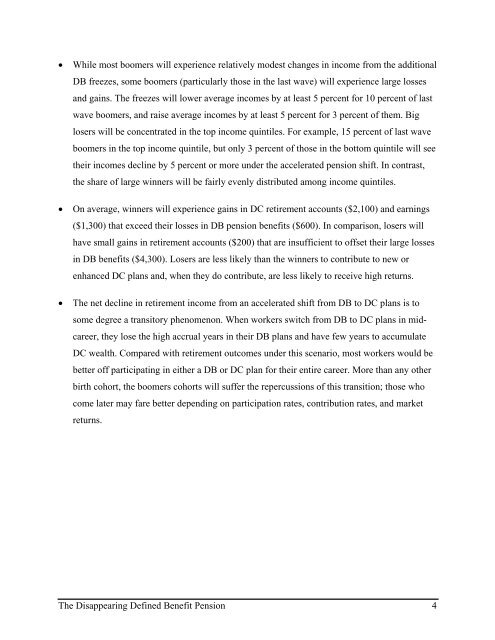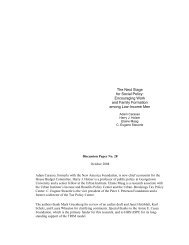Working Paper - Urban Institute
Working Paper - Urban Institute
Working Paper - Urban Institute
Create successful ePaper yourself
Turn your PDF publications into a flip-book with our unique Google optimized e-Paper software.
• While most boomers will experience relatively modest changes in income from the additional<br />
DB freezes, some boomers (particularly those in the last wave) will experience large losses<br />
and gains. The freezes will lower average incomes by at least 5 percent for 10 percent of last<br />
wave boomers, and raise average incomes by at least 5 percent for 3 percent of them. Big<br />
losers will be concentrated in the top income quintiles. For example, 15 percent of last wave<br />
boomers in the top income quintile, but only 3 percent of those in the bottom quintile will see<br />
their incomes decline by 5 percent or more under the accelerated pension shift. In contrast,<br />
the share of large winners will be fairly evenly distributed among income quintiles.<br />
• On average, winners will experience gains in DC retirement accounts ($2,100) and earnings<br />
($1,300) that exceed their losses in DB pension benefits ($600). In comparison, losers will<br />
have small gains in retirement accounts ($200) that are insufficient to offset their large losses<br />
in DB benefits ($4,300). Losers are less likely than the winners to contribute to new or<br />
enhanced DC plans and, when they do contribute, are less likely to receive high returns.<br />
• The net decline in retirement income from an accelerated shift from DB to DC plans is to<br />
some degree a transitory phenomenon. When workers switch from DB to DC plans in midcareer,<br />
they lose the high accrual years in their DB plans and have few years to accumulate<br />
DC wealth. Compared with retirement outcomes under this scenario, most workers would be<br />
better off participating in either a DB or DC plan for their entire career. More than any other<br />
birth cohort, the boomers cohorts will suffer the repercussions of this transition; those who<br />
come later may fare better depending on participation rates, contribution rates, and market<br />
returns.<br />
The Disappearing Defined Benefit Pension 4





